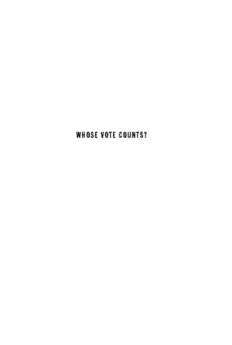
Whose vote counts? PDF
Preview Whose vote counts?
WHOSE VOTE COUNTS? ‘‘NewDemocracyForumoperatesatalevelofliteracyand responsibilitywhichisalltoorareinourtime.’’ —JohnKennethGalbraith OtherbooksintheNewDemocracyForumseries: TheNewInequality:CreatingSolutionsforPoorAmerica, byRichardB.Freeman ACommunityofEquals:TheConstitutionalProtectionofNew Americans,byOwenFiss MetroFutures:EconomicSolutionsforCitiesandTheirSuburbs, byDanielD.LuriaandJoelRogers UrgentTimes:PolicingandRightsinInner-CityCommunities, byTraceyL.MearesandDanM.Kahan WillStandardsSavePublicEducation?byDeborahMeier DoAmericansShopTooMuch?byJulietSchor BeyondBackyardEnvironmentalism,byCharlesSabel,Archon Fung,andBradleyKarkkainen IsInequalityBadforOurHealth?byNormanDaniels,Bruce Kennedy,andIchiroKawachi What’sWrongwithaFreeLunch?byPhilippeVanParijs AreElectionsforSale?byDavidDonnelly,JaniceFine,and EllenS.Miller WHOSE VOTE COUNTS? ROBERT RICHIE AND STEVEN HILL EDITED BY JOSHUA COHEN AND JOEL ROGERS FOR BOSTONREVIEW BEACON PRESS BOSTON BEACONPRESS BeaconStreet Boston,Massachusetts- www.beacon.org BeaconPressbooksarepublishedundertheauspicesofthe UnitarianUniversalistAssociationofCongregations. (cid:1),byJoshuaCohenandJoelRogers OriginallypublishedasReflectingAllofUs: TheCaseforProportionalRepresentation all rights reserved PrintedintheUnitedStatesofAmerica TheForewordbyLaniGuinierisacondensedversionofChapterof LiftEveryVoice:TurningaCivilRightsSetbackintoaNewVisionofSocial JusticebyLaniGuinier.Copyright(cid:1)byLaniGuinier.Reprinted withpermissionoftheauthorandthepublisher,Simon&Schuster. PortionsoftheForewordoriginallypublishedintheNewYorkTimes, December,. Thisbookisprintedonacid-freepaperthatmeetstheuncoatedpaper ansi/nisospecificationsforpermanenceasrevisedin. CompositionbyWilsted&TaylorPublishingServices LibraryofCongressCataloging-in-PublicationData Richie,Robert. [Reflectingallofus] Whosevotecounts?/RobertRichieandStevenHill;editedbyJoshua CohenandJoelRogersforBostonreview. p. cm.—(Newdemocracyforum) Originallypublishedas:Reflectingallofus:thecaseforproportional representation.c. Includesbibliographicalreferences. isbn---(pbk.) .Proportionalrepresentation—UnitedStates. .Representative governmentandrepresentation—UnitedStates. .Elections—United States. I.Hill,Steven. II.Cohen,Joshua,– . III.Rogers,Joel, – . IV.Bostonreview(Cambridge,Mass.:) V.Title. VI.Series. jf1075.u6r552001 .(cid:1)—dc Thepureideaofdemocracy,accordingtoitsdefinition,isthe governmentofthewholepeoplebythewholepeople,equally represented.Democracyascommonlyconceivedandhitherto practiced,is thegovernment ofthewhole peopleby amere majorityofthepeople,exclusivelyrepresented.Theformeris synonymous with the equality of all citizens; the latter, strangelyconfoundedwithit,isagovernmentofprivilege, infavorofthenumericalmajority,whoalonepossesspracti- cally any voice in the State. This is the inevitable conse- quenceofthemannerinwhichthevotesarenowtaken,the completedisenfranchisementofminorities. —johnstuartmill,RepresentativeGovernment CONTENTS ForewordbyLaniGuinier / ix Editors’PrefacebyJoshuaCohen andJoelRogers / xvii 1 robertrichieandstevenhill TheCaseforProportionalRepresentation / 2 cynthiamckinney KeepItSimple / johnferejohn CautionaryNotes / e.joshuarosenkranz SolvingaLegalPuzzle / garyw.cox Instability? / danielcantor MakingItHappen / rossmirkarimi MixingtheMessage / anthonythigpenn ComeOutFighting / pamelas.karlan ABiggerPicture / 3 robertrichieandstevenhill Reply / AppendixA:APRGlossary / AppendixB:Resources / Notes / AbouttheContributors / FOREWORD lani guinier The decisive moment in the presidential election did not take place in the voting booths or in the public tabulationofballotsbutinthesecretdeliberationsofthe U.S.SupremeCourt.Whatbeganasjudicialoverreach- ing when the results of those deliberations were an- nouncedonDecember , ,inBushv.Goreshould nowbecomeaclarioncallformajordemocraticreform. SomelegalexpertsarguethattheUnitedStatesSupreme Court decision, though heavily criticized for handing theelectiontoGeorgeW.Bush,couldhelpopenthelo- calcourthousedoorstoelectionreform.Theselegalop- timists rely on language in that decision in which the Courtdeclaredthatastatemaynot‘‘byarbitraryanddis- paratetreatmentvalueoneperson’svoteoveranother.’’ Perhaps, given its new rhetoric about valuing votes equallyinordertorestorecitizenconfidenceintheout- comeofelections,theSupremeCourt’sconservativema- jority will now look closely at other suits based on the principle of equal protection—others that, like Bush v. Gore, challenge disparate treatment of voters in voting ff procedures.Butthemoreimportante ectoftheCourt’s { ix } LANI GUINIER intervention,bolsteredbyitschoiceoflanguageexplic- itlyvaluingnoperson’svoteoveranother’s,wouldbeto launchacitizen’spro-democracymovement. Theoneperson,onevotelanguageoftheCourtunder Chief Justice Earl Warren—language that the recent decisiondrawson—didexactlythat,inspiringcivilrights ff marchers in the s. Current e orts could focus on creating new federal reforms, like financial assistance to poor counties to upgrade voting equipment and the eliminationofallwaysofrecordingvotesthatfailtogive thevoterfeedbackastohowhisorherintentisbeingreg- istered.Alsoneededaremeaningfulassistancetosemi- literate or non-English-speaking voters, twenty-four- hourpollingplaces,andanationalElectionDayholiday. Enacting standards for federal elections is consistent with the Voting Rights Act, which has banned literacy tests nationwide as prerequisites for voting. That ban waspassedbyCongressin andunanimouslyupheld bytheSupremeCourt. But reforms to equalize voting access, while impor- tant,arenotenough.Thecircumstancesofthiselection callforalargerfocusonissuesofrepresentationandpar- ticipation. If we are to build a genuine pro-democracy movementinthiscountry,wecannotlimitourselvesto butterflyballotsandchads. Voters must have a more meaningful opportunity to participate in the entire democratic process—and not justonElectionDay.Inourcurrentsystemof‘‘winner- { x }
